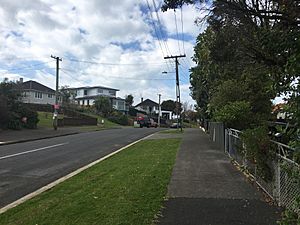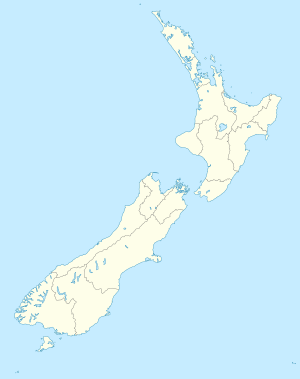Glen Innes, New Zealand facts for kids
Quick facts for kids
Glen Innes
|
|
|---|---|
|
Suburb
|
|

Glen Innes, September 2018
|
|
| Country | New Zealand |
| Local authority | Auckland |
| Electoral ward | Maungakiekie-Tāmaki ward |
| Local board | Maungakiekie-Tāmaki Local Board |
| Board subdivision | Tāmaki |
| Area | |
| • Land | 137 ha (339 acre) |
| Population
(June 2023)
|
|
| • Total | 4,960 |
| Train station(s) | Glen Innes Railway Station |
|
|
||
Glen Innes is a suburb in East Auckland, New Zealand. It is about nine kilometres east of Auckland city centre, near the Tamaki River estuary.
The area got its name from a large farm owned by William Innes Taylor. He was one of four Taylor brothers who came to Auckland. William Innes Taylor had his farm, called Glen Innes, in this area. His brothers also had farms nearby.
The main streets in Glen Innes are Taniwha Street and Apirana Avenue. These streets meet in the suburb's shopping area. Glen Innes has its own train station on the Eastern Line of the Auckland rail network. It is also a main stop for buses in eastern Auckland.
Glen Innes has many state houses, which are homes provided by the government. The government has been working to improve these homes. One project, "Talbot Park," built more apartment-style homes. The Tāmaki Regeneration Programme plans to change many public homes into new private, affordable, and public homes. This aims to create new, lively neighbourhoods.
Contents
Early European Settlement
The first government land sale in the Tamaki area happened on 1 February 1842. People bought land for farming. William Innes Taylor arrived in Auckland in November 1843. He bought his first piece of land soon after.
Taylor named his farm the Glen Innes estate. Over time, he bought more land. By 1862, Taylor owned about 751 acres. The place where Taylor built his home is now where Glen Taylor School stands on West Tamaki Road. Even though his house is gone, a large Morton Bay fig tree, thought to be planted by Taylor, is still there at the school's entrance.
William Innes Taylor passed away on 7 March 1890. By 1913, about 400 acres of the Glen Innes estate had been sold. This land was known for its beautiful seaside spots.
Who Lives in Glen Innes?
The area called Glen Innes West is about 1.37 square kilometres. It has an estimated population of 4,960 people.
In 2018, Glen Innes West had 4,413 people living there. This was a big increase from 2013 and 2006. The average age of people living here was 29 years old. Many young people live in Glen Innes, with about 25.5% of residents being under 15 years old.
Glen Innes is a diverse place. In 2013, many different groups lived there. These included people of European, Māori, Pacific, and Asian backgrounds. About 33.8% of people were born outside New Zealand.
Schools in Glen Innes
Glen Innes has several schools for different age groups:
- Tamaki College is a high school for students from years 9 to 13.
- Glen Innes School is a primary school for years 1 to 8.
- St Pius X Catholic School is a Catholic primary school.
- Sacred Heart College is a Catholic boys' school for years 7 to 13.
- Te Kura Kaupapa Māori o Pūau Te Moananui-ā-Kiwa is a school that teaches all years (1-13) mainly in the Māori language.
All these schools welcome both boys and girls, except for Sacred Heart College which is for boys.
Matariki Light Trail
Since 2013, Glen Innes has hosted the Te Ara Rama Matariki Light Trail every year. This event celebrates Matariki, which is the Māori New Year. It is an outdoor festival with lights that runs through Maybury Reserve.
The festival usually lasts for nine nights. Each night represents one of the nine stars of Matariki. On the last night, there is a big fireworks show. It's a fun way for the community to celebrate together.
Redevelopment in Glen Innes
There have been discussions and protests in Glen Innes about plans to change some of the state-owned houses. Housing New Zealand wants to replace older houses on large sections with more modern homes. This includes building more homes for private ownership.
These changes sometimes mean that people who have lived in their homes for a long time need to move. Community members have raised concerns that these changes are affecting their neighbourhood. They worry about how the changes impact the community spirit. Housing New Zealand says these changes will create better homes and make good use of the land.
Famous People from Glen Innes
Some well-known people have come from Glen Innes:
- Dave Dobbyn - A famous New Zealand musician.
- George Moala - A professional rugby player.


